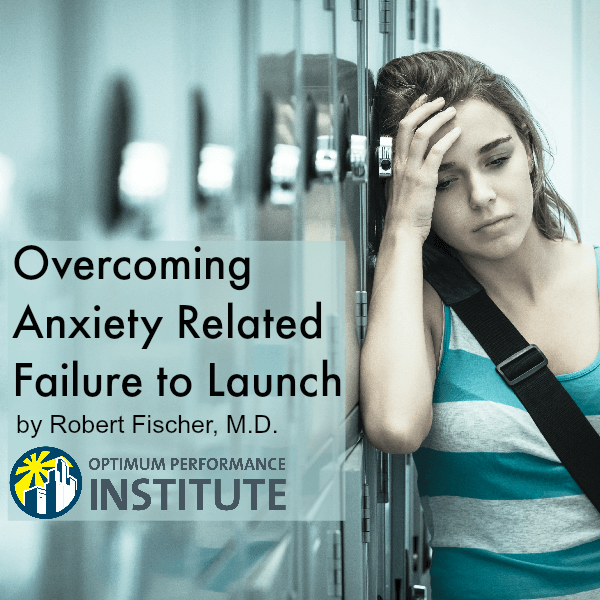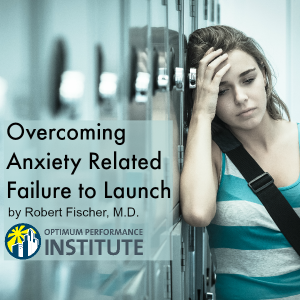
Overcoming Anxiety Related Failure to Launch Issues
 Anxiety can be extremely difficult to describe and understand because all of us at times are anxious, and this phenomenon manifests itself in a variety of ways. It may show up in our body by us genuinely having headaches, stomach aches, nausea, or muscle tension. The pain and other uncomfortable physical sensations are real, and the potential disruption these can cause in a young adult’s life is very impactful. A perceived decreased ability to show up and be present for both every day and important life events, including school, work, extracurricular activities, and other social commitments, can trigger a failure to launch into the next phase of development in young adulthood.
Anxiety can be extremely difficult to describe and understand because all of us at times are anxious, and this phenomenon manifests itself in a variety of ways. It may show up in our body by us genuinely having headaches, stomach aches, nausea, or muscle tension. The pain and other uncomfortable physical sensations are real, and the potential disruption these can cause in a young adult’s life is very impactful. A perceived decreased ability to show up and be present for both every day and important life events, including school, work, extracurricular activities, and other social commitments, can trigger a failure to launch into the next phase of development in young adulthood.
A lack of knowledge of effective skills for managing and coping with anxiety are at the core of the failure to launch issues. Rather than sitting with the symptoms that come up and allowing them to pass – something much easier said than done, but something that can indeed be mastered – some individuals become emotionally dysregulated and feel unable to cope. They may become irritable, frightened, and simply more difficult to relate to, because in their anxious state, they unknowingly often enter into rigid thinking patterns. They are afraid and begin naturally, on an unconscious level, thinking in very black or white, all-or-nothing terms.
These fight-or-flight “survival” thinking patterns can result in one feeling as if he or she has many less options than are present. This distorted cognition only adds to the anxiety and sense of helplessness and loss of control, compounding suffering exponentially. Anxiety at this level can interfere with a young adult’s ability to persevere and can contribute to his or her counterproductive attempts to insulate from the anxiety, such as by isolating, withdrawing, and even self-medicating or self-harming.
Fundamentally the anxiety is self-limiting. Rather than the launch into adulthood (college, the workplace, independent living) being seen as an exciting journey of transitioning and transformation in the young adult’s life, the fear and anxiety takes the motivation, and at times the joy, out of the process. It is also difficult for many to acknowledge that they are anxious, particularly young adults.
As a parent, you might find yourself met with resistance with tasks that seem “normal” and even exciting to you but that seem daunting and overwhelming to your child: Why don’t we fill out college applications/ look for job/ find another supportive group of peers? The universal answer is, “Well I can’t. I don’t want to,” but in fact they are too scared or frightened.
This anxiety inevitably has a tremendous impact on self-esteem. Many times, individuals avoid successfully completing things, whether they be social interactions, academic achievements, or work interactions. For fear of failing due to routinely having difficulties following through as a result of anxiety, they begin a pattern of not completing things. When this happens chronically, it creates a tremendous sense of lack of confidence in one’s self and one’s ability to persevere.
Fundamentally, the rule of thumb to overcoming debilitating anxiety that is causing a failure to launch is to face one’s fears in a safe, supportive, therapeutic environment that reinforces progress and successes and helps the young adult to build confidence in his or her ability to persevere. At Optimum Performance Institute, we do this in an experiential way. Our team of compassionate clinicians, life coaches, independent living specialists, and other support staff members know that the more we avoid those things that are necessary for us to progress, this only reinforces the anxiety. Avoidance reinforces one’s sense of low esteem, of not feeling confident and strong.
For many, if they are afraid to express their intense feelings, isolation results. We take this seriously, as isolation leads to a disconnect from the creative, nurturing, and supportive part within as well as that of others, and we work with young adults to reestablish this much needed, healing connection. One needs to be given hope, based on incremental, actual successes. We help your child create meaningful social bridges of engagement and teach him or her how to continue doing so after discharge from our program.
We strategically combine cognitive behavioral types of approaches (CBT) with experiential opportunities to face the fears in group process, individual psychotherapies, and opportunities to develop a sense of confidence that we can master things — that it’s okay to be frightened.
We work with young adults to develop mindful awareness of their experiences of anxiety while understanding that the fear does not need determine his or her actions. One can acknowledge the fear and still act and cope effectively. You can be afraid to show up to class, but with the right preparation, coping ahead, and use of skills and tools, you can show up anyway, experience a sense of accomplishment, and overcome the anxiety.
We provide the support to make this possible: life coaching, a supportive peer group, and other integrated experiences to support the process. At OPI, we also utilize both pharmacologic and non-pharmacologic approaches spanning activities from meditation exercises to biofeedback.
We don’t treat just one symptom or just the diagnosis but the many dependent variables the young adult is experiencing, including social and academic development and a balance between work, school, and play. The highest probability of success for overcoming failure to launch issues is by skillfully engaging young people in opportunities to build bridges of engagement through multiple developmental areas.
For more information on OPI’s residential and intensive outpatient (IOP Day Treatment) programs and our measures to help young adults overcome anxiety related Failure to Launch issues, call us at (888) 814-5985 or click HERE to submit an online form. We want to help and will be in touch promptly.
